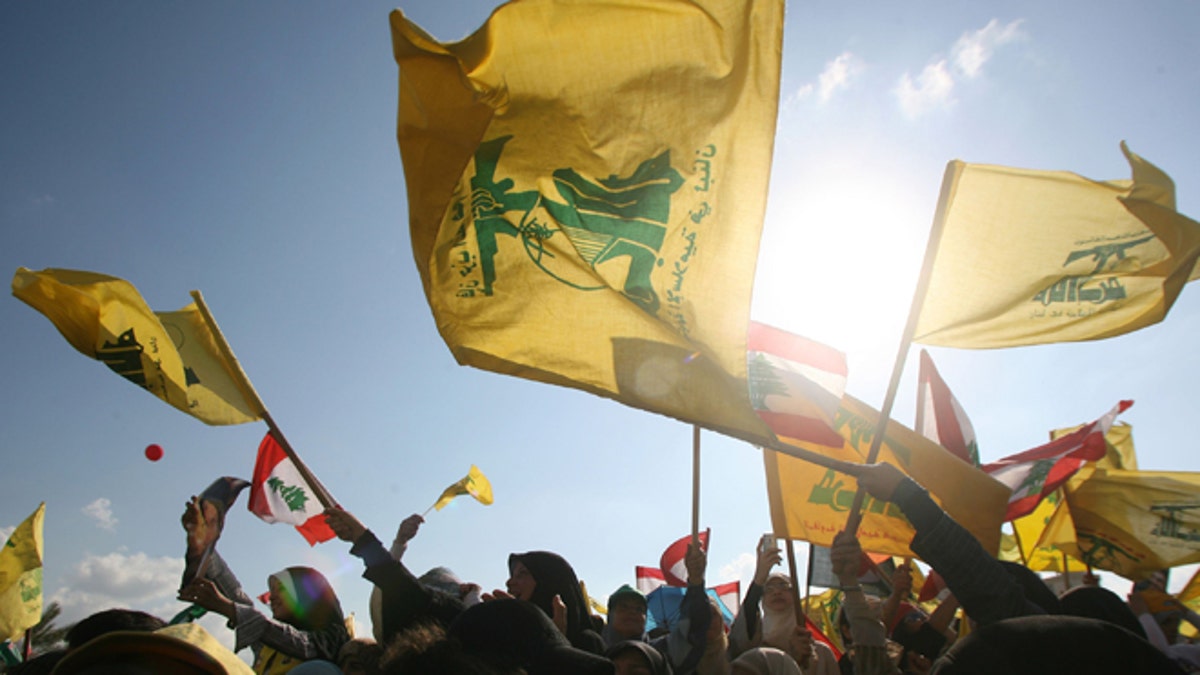
BEIRUT, LEBANON- SEPTEMBER 22: Hezbollah supporters wave flags during a ''Victory over Israel'' rally in Beirut's suburbs on September 22, 2006 in Beirut, Lebanon. Hezbollah leader Sayyed Hassan Nasrallah reportedly said that Hezbollah would not disarm until a Lebanese government capable of protecting the country was in place during the rally. (Photo by Salah Malkawi/Getty Images) (Getty Images)
The Lebanon-based extremist group Hezbollah has business connections with South American drug cartels, and has been using them to enter the narcotics trafficking business, the U.S. Drug Enforcement Administration announced this week.
The DEA said the terrorist group’s External Security Organization Business Affairs Component has established business relationships with drug cartels, such as Colombia's La Oficina de Envigado, to bring large quantities of cocaine from Latin America to markets throughout Europe.
The group is also allegedly responsible for laundering drug proceeds as part of a money laundering scheme called the Black Market Peso Exchange.
"It's money for the terrorists and a market for the drug traffickers," Barbara Carreno, a spokesperson with the DEA told Fox News Latino. "It's quid pro quo."
The DEA operation, called "Project Cassandra," is meant to disrupt and dismantle Hezbollah's global network that supplies drugs to the U.S. and Europe as well as cut into the terror organization's ability to fund its activities through drug trafficking.
In the investigation, authorities uncovered a network of money couriers who collect and transport millions of euros in drug proceeds from Europe to the Middle East. The currency is then paid in Colombia to drug traffickers using the Hawala disbursement system, which makes it difficult to track.
Much of the drug proceeds moved through Lebanon and a significant portion of it benefitted Hezbollah, the DEA said.
"These drug trafficking and money laundering schemes... provide a revenue and weapons stream for an international terrorist organization responsible for devastating terror attacks around the world," DEA Acting Deputy Administrator Jack Riley said in a statement.
Hezbollah has long established ties with Latin American criminal groups.
In 2014, Brazilian police documents revealed ties between weapon traffickers tied to Hezbollah and the Brazilian prison gang First Capital Command (PCC). The documents showed traffickers operating in the tri-border region of Argentina, Brazil and Paraguay who were supplying weapons to the PCC in exchange for protection of inmates of Lebanese origin in Brazil's prisons.
Besides putting the PCC in contact with weapon dealers on the shady international arms market, the alleged Hezbollah-linked traffickers also acted as intermediaries in the sale of C4 explosives that the PCC stole from Paraguay.
These connections between the two groups apparently date back to 2006 and first surfaced on the Brazilian police's radar in 2008.
Brazil, which has become a hotspot for smugglers, has drawn the attention of the U.S., Israel and governments throughout South America.
The region has drawn a number of immigrants from the Middle East, particularly from Lebanon, and is believed to be one of Hezbollah's major areas of operation outside of the Islamic world, due to its seclusion, loose borders, rampant political corruption and weak judicial system. Brazil has one of the largest Lebanese population's outside of Lebanon with at least 7 million people from that country residing there. Some estimates claim closer to 13 million Lebanese live in Brazil.
